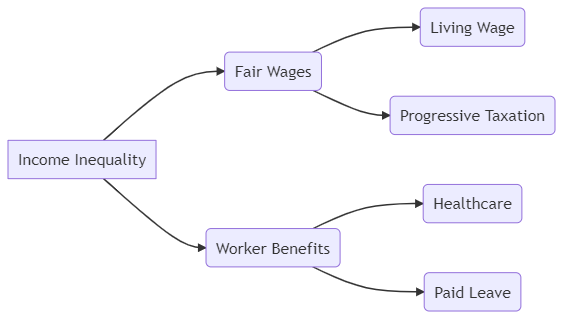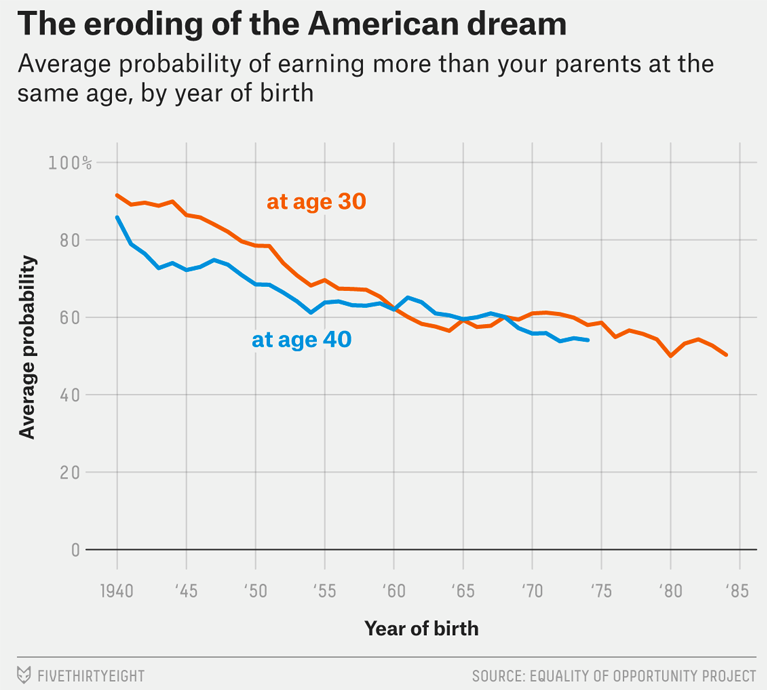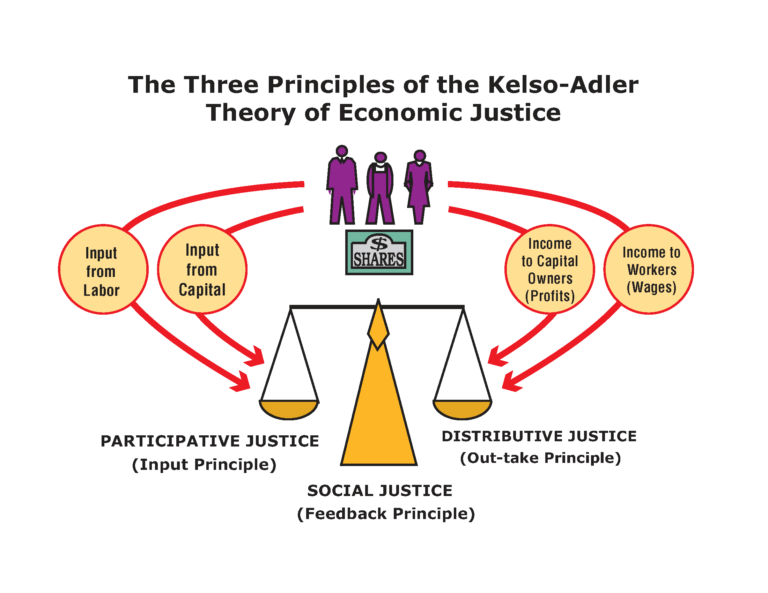
We are committed to promoting economic justice for all. This article will provide a comprehensive guide to achieving economic justice, covering topics such as income inequality, fair taxation, and equal access to education.
Income Inequality:
Addressing the Gap Income inequality is a significant issue affecting many worldwide. Unfortunately, the wealth gap has widened in recent years, with the wealthiest 1% owning more than half of the world’s wealth. To address this issue, we must look at policies promoting fair wages, such as a living wage and progressive taxation. We also need to ensure that workers have access to benefits such as healthcare and paid leave. By addressing these issues, we can help to create opportunities to reduce income inequality and promote economic justice.
Fair Taxation:
Ensuring Everyone Pays Their Fair Share Another essential component of achieving economic justice is fair taxation. Unfortunately, many individuals and corporations avoid paying their fair share of taxes, which leads to a lack of funding for essential services such as education and healthcare. To address this issue and achieve the ultimate goal of economic justice, we must reform the tax code to ensure everyone pays their fair share. We must also close tax loopholes that allow corporations to avoid paying taxes. By implementing appropriate taxation policies, we can ensure that everyone contributes to society and help to promote economic justice.
Access to Education:
Providing Opportunities for All Education is a crucial factor in promoting economic justice. Without access to education, individuals may not have the skills or knowledge necessary to succeed in the workforce. To address this issue, we need to ensure everyone has access to high-quality education regardless of socioeconomic status. This can be achieved by investing in public education, providing scholarships and grants for low-income students, and expanding access to vocational training. By providing opportunities for all, we can help to promote economic justice and reduce income inequality.

As economics and economic justice experts, we have identified key issues and opportunities that can help individuals and communities achieve greater economic fairness and prosperity. Our research has led us to discover several strategies that can promote economic justice, including regarding wage gaps, advocating for policies that support fair wages, protecting workers’ rights, and investing in education and training programs.
Fair Wages and Worker Protections
One of the most fundamental aspects of economic justice is ensuring that individuals are paid a fair wage for their work. This means advocating for policies establishing minimum wage as a living wage and guaranteeing equal pay for equal work. In addition to being well due to fair wages, workers also need protection against exploitation and abuse, including the right to form unions, safe and healthy working conditions, and protection from discrimination and harassment.
Education and Training
Education and training are essential to economic justice, providing individuals with the knowledge and skills they need to compete in the modern workforce. We believe investing in education and training programs can help individuals and communities achieve greater economic prosperity by providing access to the tools and resources needed to succeed in today’s economy.
Investment in Community Development
Investing in community development is another critical strategy for promoting economic justice. This can involve supporting small businesses and entrepreneurs, building affordable housing, and creating opportunities for community engagement and participation in the financial system. Investing in community development can help create more equitable and sustainable economic systems that benefit everyone.

Important to recognize the intersections
We also believe it is essential to recognize the intersections between economic justice, income equality, and other social justice issues, such as racial justice and gender equity. Systemic barriers and discrimination can prevent individuals from accessing economic opportunities and achieving financial stability. We can create a more just and equitable society for all by addressing these issues.
Moreover, it is critical to address the root causes of economic inequality, which often stem from policies and systems prioritizing the interests of the wealthy and powerful over the needs of the many. This can include advocating for progressive tax policies, reforming corporate governance, and challenging the concentration of wealth and power in the hands of a few.
Economic justice is a global issue
It is also essential to recognize that economic justice is a global issue, with many countries and communities facing systemic economic inequality and poverty. We believe that international cooperation and solidarity can play a crucial role in addressing these issues, for example, by supporting the development of fair and sustainable global economic systems and promoting human rights and social justice.
Overall, achieving economic justice requires a sustained and coordinated effort from individuals, communities, institutions, and policymakers. By working together and prioritizing the needs of all people, we can create a more just and equitable world for ourselves and future generations.

Promoting economic justice
One key aspect of promoting economic justice is education and awareness. It is essential to educate people about economic status and the impact of economic policies and systems on their lives and to encourage them to take action to create change. This can include promoting financial literacy, advocating for policies and moral and ethical principles that support economic justice, and supporting grassroots movements that promote economic fairness and equality.
In addition to education and awareness about economic injustice and institutions, supporting and amplifying the voices of marginalized communities disproportionately affected by economic inequality is essential. This can involve providing platforms for marginalized voices, supporting community-led initiatives, and building partnerships with organizations that promote economic justice.
Finally, it is essential to acknowledge that promoting economic justice is an ongoing process that requires constant evaluation and adaptation. As the economic landscape changes and new challenges emerge, we must remain vigilant and responsive to the needs of our communities. By prioritizing all people’s needs and social welfare and committing to the ongoing work of promoting economic justice, we can create a more just and equitable world for all.

Economic justice
In addition to policies that address income distribution and inequality, fair taxation, and access to education, several other factors are essential to consider when promoting economic justice. These include access to affordable healthcare, affordable housing, and environmental justice.
Access to affordable healthcare is critical to economic justice, as it ensures everyone has access to the medical care they need without facing financial hardship. This includes preventative care, mental health services, and treatment for chronic conditions. By building economic institutions and promoting access to affordable healthcare, we can help reduce healthcare costs for individuals and families while improving overall health outcomes.
Access to affordable housing is another critical component of economic justice, as it ensures everyone can access safe and affordable housing. This includes programs that promote affordable homeownership, as well as efforts such as rental assistance programs and anti-discrimination laws that protect tenants from unfair treatment. By enabling access to affordable housing, we can help reduce housing costs for individuals and families while improving overall living conditions.
Finally, environmental justice is also essential to economic justice, as it ensures everyone has access to a clean and safe environment. This includes policies that promote clean air and water and regulations that hold polluters accountable for their actions. By promoting environmental and economic justice aims together, we can create a healthier and more sustainable society for everyone.
Economic justice is essential
Promoting economic justice is essential to creating a more equitable and prosperous society. By promoting policies that address income inequality, fair taxation, access to education, healthcare, housing, and environmental justice, we can create a future where everyone has equal opportunity and access to social services, resources, and opportunities they need to succeed. In addition, we can work towards a brighter and more just future for all through education, advocacy, and community engagement.

Conclusion
In conclusion, promoting economic justice requires a multifaceted approach that addresses various issues and opportunities. By advocating for fair wages and worker protections, investing in education and training programs, and supporting community development, we can create more equitable, productive, and sustainable economic systems that benefit everyone. At our core, economic justice is about creating equal opportunities for all individuals to thrive and achieve their full potential, regardless of their background or circumstances.
CoopBusiness is a revolutionary cooperative business-building platform that empowers individuals to become entrepreneurs, business owners, and financially independent.
As a member, you’ll receive top-level business mentorship, access to our proprietary business systems, and the opportunity to access the funds you want to turn your business ideas into reality.